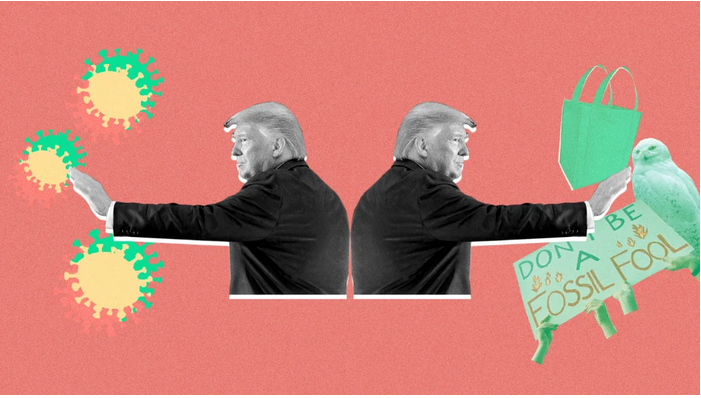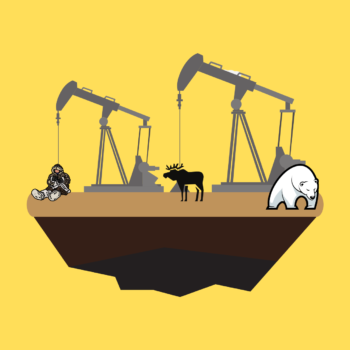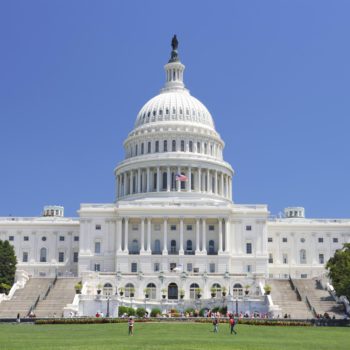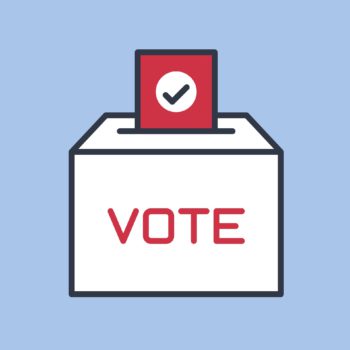In the wake of COVID-19, the federal government made critical decisions regarding the oil industry, the Environmental Protection Agency (EPA), and national parks which will leave deep wounds in the environmental movement.
Here are six environmental rollbacks made by Trump so far during the COVID crisis.
Six environmental rollbacks made by Trump during COVID
-
Amending National Environmental Policy Act
- Earlier this year, the Trump administration attempted to amend the 50-year-old National Environmental Policy Act to allow final environmental impact statements for projects with federal funding to effectively exclude climate change considerations.
-
Consequence: Projects could be greenlit without a proper accounting of all costs, including but not limited to externalities related to environmental degradation.
-
- Earlier this year, the Trump administration attempted to amend the 50-year-old National Environmental Policy Act to allow final environmental impact statements for projects with federal funding to effectively exclude climate change considerations.
-
Big Oil Buy-back
- When drafting legislation for the coronavirus stimulus package, the Trump administration intended to buy millions of barrels of oil from struggling producers. The measure was ultimately nixed in the final legislation due to lack of funding.
-
Consequence: If the administration’s proposal had passed, it could have diverted funds from other more essential COVID-19 related purposes while also establishing a precedent of bailouts for oil and gas companies triggered by falling market prices.
-
- When drafting legislation for the coronavirus stimulus package, the Trump administration intended to buy millions of barrels of oil from struggling producers. The measure was ultimately nixed in the final legislation due to lack of funding.
-
EPA Suspends Enforcement
- The Environmental Protection Agency (EPA) decided to indefinitely suspend enforcement of its rules and regulations due to COVID-19. Companies will now basically self-regulate their own air and water pollution. The rule extends retroactively to March 13th.
-
Consequence: Privatization or outright removal of enforcement of environmental rules and regulations will in all likelihood lead to increased emissions and pollution, which could have serious public health impacts that compound existing stress on our health care system.
-
- The Environmental Protection Agency (EPA) decided to indefinitely suspend enforcement of its rules and regulations due to COVID-19. Companies will now basically self-regulate their own air and water pollution. The rule extends retroactively to March 13th.
-
Bisecting a national park
- The Trump administration recently pushed through a final environmental impact statement for a 211-mile road in Alaska that would bisect a national park and open up an area rich in copper, zinc, and other minerals.
-
Consequence: Building a road through a protected national park could heavily disrupt local biodiversity and irreparably pollute pristine habitat.
-
- The Trump administration recently pushed through a final environmental impact statement for a 211-mile road in Alaska that would bisect a national park and open up an area rich in copper, zinc, and other minerals.
-
Waiver for major slaughterhouse
- The Department of Agriculture confirmed a waiver that allowed a private company to inspect a Tyson Foods slaughterhouse in lieu of the EPA.
-
Consequence: Without proper oversight of slaughterhouse practices, consumers will suffer from higher risk of contaminated food, which seems particularly shortsighted given that COVID-19 was likely caused by unsafe treatment of animal products.
-
- The Department of Agriculture confirmed a waiver that allowed a private company to inspect a Tyson Foods slaughterhouse in lieu of the EPA.
-
Lax fossil-fuel standards
- Last week, the Trump administration rolled back Obama-era fossil fuel standards for vehicles through 2026. Those standards, which passed in 2012, mandated 5% annual increases in fuel economy. The new standards will require less stringent 1.5% annual increases.
-
Consequence: Increased greenhouse gas and other pollutant emissions from vehicles, which cause air pollution that can exacerbate vulnerability to infectious diseases like COVID-19. Transportation is the most carbon-intensive sector of the American economy, so even seemingly small changes to emissions standards could have major impacts.
-
- Last week, the Trump administration rolled back Obama-era fossil fuel standards for vehicles through 2026. Those standards, which passed in 2012, mandated 5% annual increases in fuel economy. The new standards will require less stringent 1.5% annual increases.













No Comments